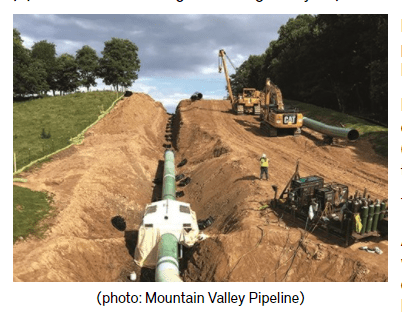After a winter hiatus in construction that stretched into the spring, summer, and fall, builders of the Mountain Valley Pipeline say they are ready to return.
In a letter filed with the Federal Energy Regulatory Commission (FERC) late Tuesday, an attorney for the joint venture of energy companies requested that a stop-work order issued last Oct. 15 be lifted.
Since work began in early 2018, litigation has caused cost overruns and construction delays for Mountain Valley. Not long after FERC issued its stop-work order, the company said it expected to be back on the job by April, but Mountain Valley still lacks two sets of key permits that were set aside after a federal appeals court sided with conservation groups, who argued that building a 303-mile natural gas pipeline through West Virginia and Virginia was causing widespread environmental harm.
A third suspended permit was reissued earlier this month by the U.S. Fish and Wildlife Service, which found that construction would not likely jeopardize protected species. That in turn led Mountain Valley to request that it be allowed to resume “all construction activities permitted by law.”
All work except for erosion control and stabilization was ceased a year ago by FERC, after the 4th U.S. Circuit Court of Appeals stayed the original biological opinion pending a legal challenge that has not gone away.
The buried pipeline cannot cross nearly 1,000 streams and wetlands until the U.S. Army Corps of Engineers grants new permits, and construction of a 3.5-mile passage through the Jefferson National Forest requires a separate approval from the U.S. Forest Service.
Mountain Valley is one of several U.S. oil and gas pipelines delayed by regulatory and legal fights with environmental and local groups that found problems with federal permits issued by the Trump administration.
In February 2018, when Equitrans started construction of the 303-mile (488-km) pipeline designed to deliver 2 billion cubic feet per day of gas from the Marcellus and Utica shale, it estimated Mountain Valley would cost about $3.5 billion and be completed by the end of 2018.
Equitrans has said it expects to receive new approvals soon from FERC and the U.S. Army Corps of Engineers that will enable it to finish building the last 8% of the project. Mountain Valley is owned by units of Equitrans, NextEra Energy Inc, Consolidated Edison Inc, AltaGas Ltd, and RGC Resources Inc.


